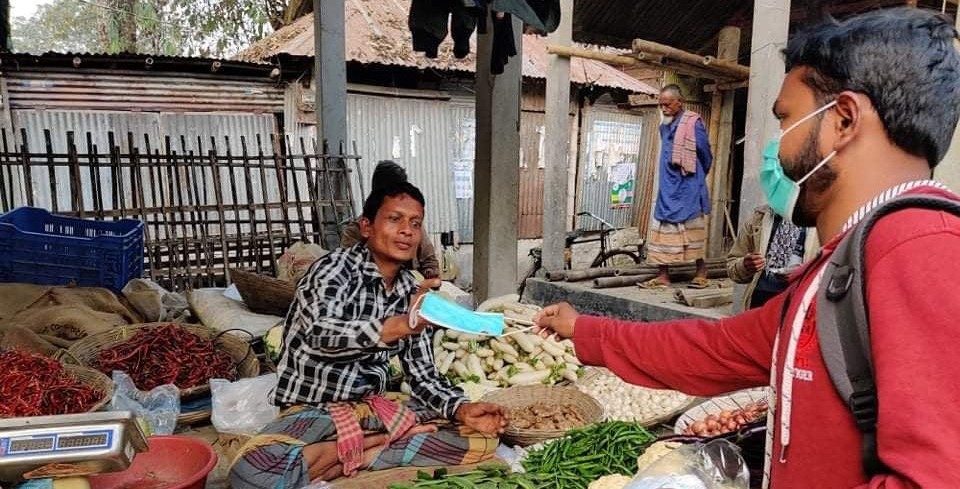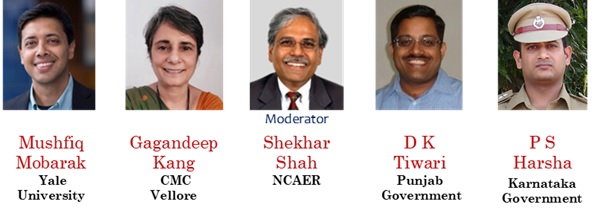Lessons from a Large-scale Masking Experiment in Bangladesh
 In mid-February this year, India was registering some 12,000 cases of covid-19 a day, fewer than many advanced countries in Europe. On April 23, India clocked some 333,000 new, positive cases, far higher than any other country at any time during this pandemic. The Economist notes that epidemiologists estimate the numbers could be 10 to 30 times higher, since testing is limited outside India’s cities. What happens in India will also matter for the world. Besides inexpensive vaccines, India may end up exporting dangerous, new SARS-CoV-2 strains.
In mid-February this year, India was registering some 12,000 cases of covid-19 a day, fewer than many advanced countries in Europe. On April 23, India clocked some 333,000 new, positive cases, far higher than any other country at any time during this pandemic. The Economist notes that epidemiologists estimate the numbers could be 10 to 30 times higher, since testing is limited outside India’s cities. What happens in India will also matter for the world. Besides inexpensive vaccines, India may end up exporting dangerous, new SARS-CoV-2 strains.
As Indians learnt last year, lockdowns can cause deep scarring in labour markets and for smaller firms. This is likely to happen again. Even if vaccine production and imports increase, India’s sharp second surge will be difficult to halt with vaccines alone. Mounting scientific evidence is pointing to covid-19 primarily transmitting through airborne aerosol transmission. This suggests that even as governments are working hard to arrange oxygen supplies, increase hospital capacity, and ramp up vaccine availability, communities should deploy effective masking strategies urgently.
 Researchers at Yale University and the Stanford Medical School, along with IPA and local partners, have run a large, 350,000-person, randomized control trial in rural Bangladesh to evaluate ways to increase mask wearing in communities and to measure its impact on covid-19 transmission rates. The research identified the precise combination of mask design, distribution and promotion strategies that led to sustained increases in mask-wearing in the community. Their work answers questions such as, which interventions increase mask wearing the most? Do social nudges or incentives increase mask wearing? Does mask promotion inadvertently decrease social distancing? What kinds of masks work best? Urgent answers to these practical questions can help as India grapples with the mounting tragedy of its second wave.
Researchers at Yale University and the Stanford Medical School, along with IPA and local partners, have run a large, 350,000-person, randomized control trial in rural Bangladesh to evaluate ways to increase mask wearing in communities and to measure its impact on covid-19 transmission rates. The research identified the precise combination of mask design, distribution and promotion strategies that led to sustained increases in mask-wearing in the community. Their work answers questions such as, which interventions increase mask wearing the most? Do social nudges or incentives increase mask wearing? Does mask promotion inadvertently decrease social distancing? What kinds of masks work best? Urgent answers to these practical questions can help as India grapples with the mounting tragedy of its second wave.
On Monday, April 26th, to discuss the potential for concerted community masking in India, NCAER, Yale, Stanford, and IPA hosted Mushfiq Mobarak, Professor at Yale University leading the Bangladesh work, Gagandeep Kang, FRS, Professor of Microbiology at CMC Vellore and one of India’s foremost epidemiologists, D K Tiwari, Principal Secretary, Medical Education & Research, Government of Punjab, and P S Harsha, Commissioner of the Department of Information and Public Relations at the Government of Karnataka. The discussion was moderated by NCAER Director General Shekhar Shah.







 In mid-February this year, India was registering some 12,000 cases of covid-19 a day, fewer than many advanced countries in Europe. On April 23, India clocked some 333,000 new, positive cases, far higher than any other country at any time during this pandemic. The Economist notes that epidemiologists estimate the numbers could be 10 to 30 times higher, since testing is limited outside India’s cities. What happens in India will also matter for the world. Besides inexpensive vaccines, India may end up exporting dangerous, new SARS-CoV-2 strains.
In mid-February this year, India was registering some 12,000 cases of covid-19 a day, fewer than many advanced countries in Europe. On April 23, India clocked some 333,000 new, positive cases, far higher than any other country at any time during this pandemic. The Economist notes that epidemiologists estimate the numbers could be 10 to 30 times higher, since testing is limited outside India’s cities. What happens in India will also matter for the world. Besides inexpensive vaccines, India may end up exporting dangerous, new SARS-CoV-2 strains. Researchers at Yale University and the Stanford Medical School, along with IPA and local partners, have run a large, 350,000-person, randomized control trial in rural Bangladesh to evaluate ways to increase mask wearing in communities and to measure its impact on covid-19 transmission rates. The research identified the precise combination of mask design, distribution and promotion strategies that led to sustained increases in mask-wearing in the community. Their work answers questions such as, which interventions increase mask wearing the most? Do social nudges or incentives increase mask wearing? Does mask promotion inadvertently decrease social distancing? What kinds of masks work best? Urgent answers to these practical questions can help as India grapples with the mounting tragedy of its second wave.
Researchers at Yale University and the Stanford Medical School, along with IPA and local partners, have run a large, 350,000-person, randomized control trial in rural Bangladesh to evaluate ways to increase mask wearing in communities and to measure its impact on covid-19 transmission rates. The research identified the precise combination of mask design, distribution and promotion strategies that led to sustained increases in mask-wearing in the community. Their work answers questions such as, which interventions increase mask wearing the most? Do social nudges or incentives increase mask wearing? Does mask promotion inadvertently decrease social distancing? What kinds of masks work best? Urgent answers to these practical questions can help as India grapples with the mounting tragedy of its second wave.